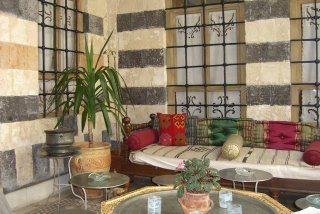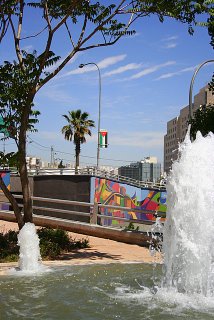My hero!
http://www.msnbc.msn.com/id/13007826/site/newsweek/from/ET/
We are three American and three British women who are married to Jordanians and have lived in Jordan for many many many years! We want to share our experiences and views of our lives in Jordan.
 A couple of weeks ago I went to Damascus with some friends and stayed in the lovely Beit Al Mamlouka Hotel which is situated at Bab Touma in the Old City of Damascus. A lovely hotel with eight rooms all decorated beautifully. The two pictures show the inner courtyards. Quite expensive but worth it. We walked down the lovely narrow alleyways to the Grand Mosque and Suq looking at all the interesting shops. We bought sweets, carpets, tablecloths and even had some fun looking at the underwear shops which were amazing. Brightly coloured feathers with lights and music when pressed!
A couple of weeks ago I went to Damascus with some friends and stayed in the lovely Beit Al Mamlouka Hotel which is situated at Bab Touma in the Old City of Damascus. A lovely hotel with eight rooms all decorated beautifully. The two pictures show the inner courtyards. Quite expensive but worth it. We walked down the lovely narrow alleyways to the Grand Mosque and Suq looking at all the interesting shops. We bought sweets, carpets, tablecloths and even had some fun looking at the underwear shops which were amazing. Brightly coloured feathers with lights and music when pressed! It is lovely to be in an Arab city which is Arab and has not been overwhelmed with Western culture. The people were all charming and helpful and even in the crowded Suq Al Hammadieh we never once felt hassled.
It is lovely to be in an Arab city which is Arab and has not been overwhelmed with Western culture. The people were all charming and helpful and even in the crowded Suq Al Hammadieh we never once felt hassled. 


 Photo of rural development in harmony with its surroundings - in this case Dibeen Forest - why upset the balance of natural growth ie the needs of the local inhabitants vs. corrupting influence of real estate developers with only one thing in mind - money.
Photo of rural development in harmony with its surroundings - in this case Dibeen Forest - why upset the balance of natural growth ie the needs of the local inhabitants vs. corrupting influence of real estate developers with only one thing in mind - money. Photo overlooking Dibeen Nature Reserve - the only place in Jordan where you can actually see the colour green.
Photo overlooking Dibeen Nature Reserve - the only place in Jordan where you can actually see the colour green.